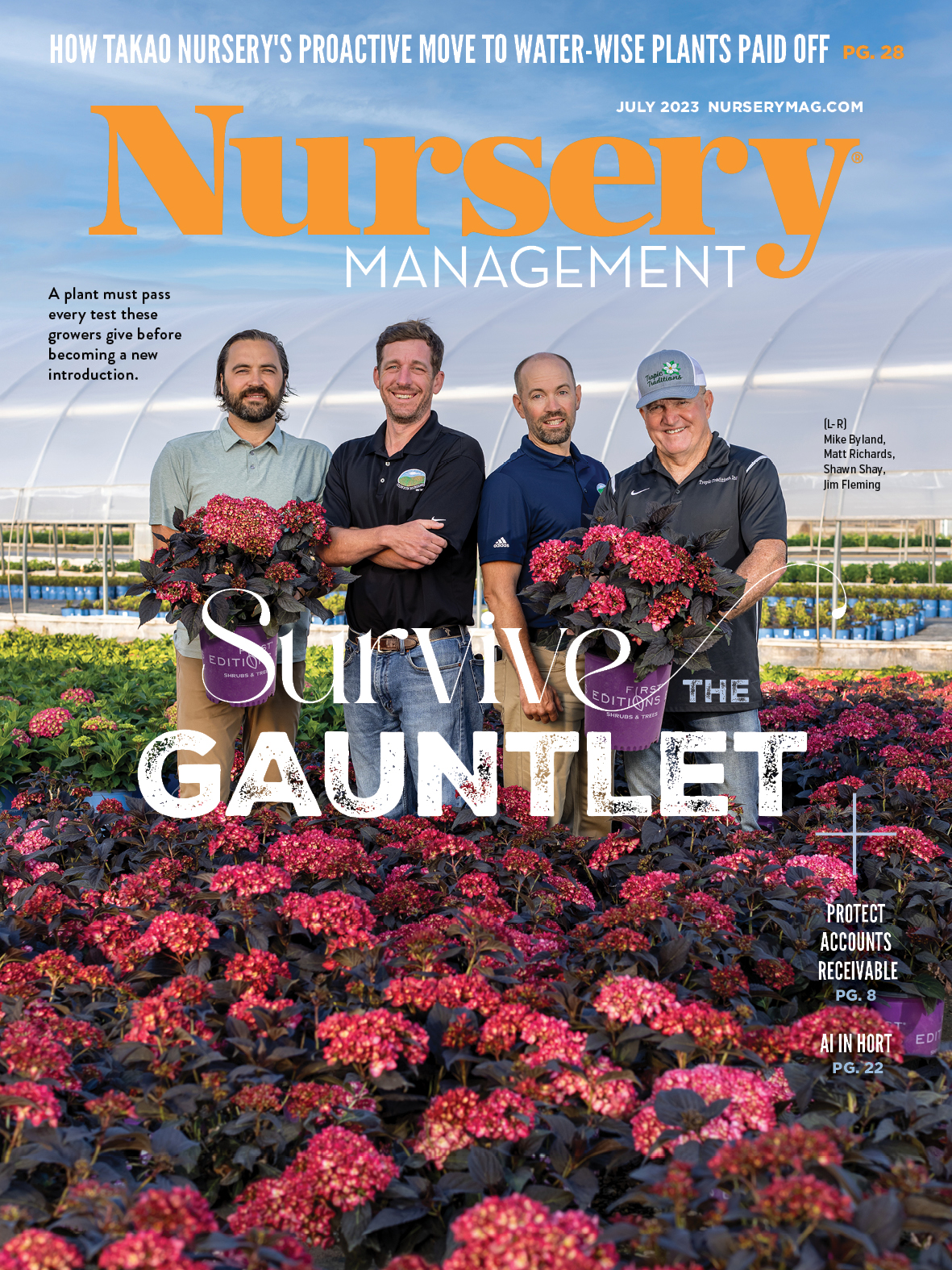

NM: How did you get started in horticulture?
AF: I originally was pre-med in undergrad. I didn't want to be a doctor, but I knew I wanted to do something in science. Slowly, over the course of four years, I realized botany was awesome. I took as many botany classes as I could, and I fell in love with it. After undergrad, I decided to pursue grad school. I went to Ohio State, and I worked in a plant cell transformation lab. I know that sounds really weird, but we did genetic engineering of soybeans. We used a gene gun to deliver the DNA into the soybean tissue, and I loved it.
NM: Can you tell me about your 15 years of experience at Ball Horticultural Company?
AF: Eventually after getting my masters, I found out about Ball, and that they were starting a small research group within the company called Ball Helix. I basically was the baby of the original Ball Helix. I was the youngest of 12 of us at the time, starting this new venture. I was very green, very excited, and there were lots of different science disciplines — analytical chemistry, molecular tissue culture — and I basically helped everybody in those disciplines. Through that I was able to learn a lot of different methods and techniques, and I basically wanted to be somebody that could help out in the lab no matter what. I just loved being in a lab environment, and it is still to this day what I want to be doing. I mentored many people in virus testing through the years at Ball to teach them the different techniques in the lab. Over time I changed different positions within Ball Helix, depending on where the research and development was going. I really liked the diversity and multitasking, and I think having this background knowledge helped me, not even realizing it at the time.
NM: Why did you decide to start your own business, Lizzy Blossom?
AB: It never actually dawned on me that I could set up my own lab until an opportunity came about five years ago. An investor was interested in starting a science lab, and he wanted me to be the head of it. I thought it was a joke at first, but we went ahead. It’s been ups and downs for sure, but in the end, it has been so worth it. All my blood, sweat and tears have been put into this company, and it is starting to pick up speed. We're starting to get clients. People are starting to learn about us and what services we can provide for a horticulture company.
NM: What kind of services does Lizzy Blossom offer growers?
AF: We can do routine testing of your crops, for viruses, bacteria, fungi, whether or not you’re seeing symptoms. We also do diagnostic testing, so if you are seeing symptoms, we can do it that way too. A lot of breeders like our routine testing because we'll test for around 10 different viruses. Then people in production, when they see a problem, they want to send that issue to see if weacn figure out what is atually going on. Is this a virus? Can we identify it? The more we know about the pathogen, the more we can figure out what to do after the pathogen is present. So I have a lot of breeders that like to do the virus panel screen for their particular crop — like the top ten viruses that could go to Petunia. Then I have people that want a specific problem tested, and some people just don't know, which is perfectly fine. They just want us to help them figure out what's going on. Everything is kind of individual based on what's going on with that company.
NM: Can you elaborate on the importance of plant pathogen testing and why nurseries and growers should do this?
AF: Viruses are sneaky, and we don’t necessarily know when they're present because they don't necessarily get tested initially, that's more bacteria and fungi. One of the potential problems that can happen is that you could have a crop that has a virus present, but does not show symptoms and you never tested it for a virus. Then all of a sudden, in a completely different crop, the virus is growing next to that crop. You start seeing virus symptoms, and you're like, where in the world did that come from Viruses can jump to different crops, and sometimes they show symptoms and sometimes they don't. So, you could be infecting another one of your crops, not even realizing it with virus because it doesn't show symptoms. Then the environmental conditions are perfect for this other crop and for the virus, and the virus just goes crazy. I think a lot of people don't realize viruses can jump from crop to crop. Start clean, stay clean.
For more: www.lizzyblossom.com

Explore the July 2023 Issue
Check out more from this issue and find you next story to read.
Latest from Nursery Management
- GardenComm 2024 Annual Conference registration is open
- Landmark Plastic celebrates 40 years
- CropLife applauds introduction of Miscellaneous Tariff Bill
- Greenhouse 101 starts June 3
- Proven Winners introduces more than 100 new varieties for 2025
- CIOPORA appoints Micaela Filippo as vice secretary-general
- Rock Star Roses
- The container challenge





